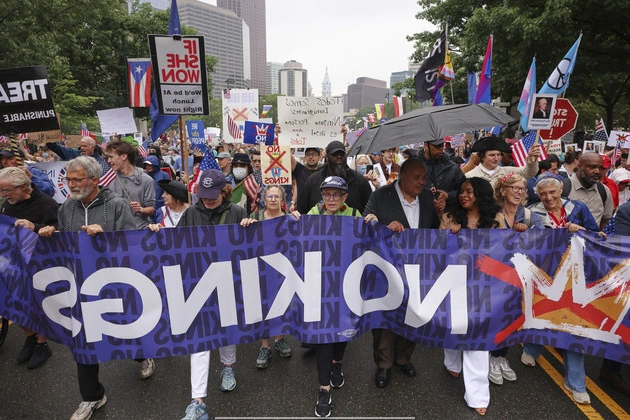
As President Donald Trump’s military parade rolls through the nation’s capital on Saturday, millions of Americans across the country are taking part in the largest coordinated protests against the president since the start of his second administration.
But while Trump’s parade aims to show America’s military prowess in its new era — remade under the administration’s anti-diversity, equity and inclusion policies — over 2,000 protests planned for major cities and small towns across the country are expected to outdo the president’s parade in scale.
The demonstrations, organized by an extensive list of progressive organizations including the ACLU, Indivisible and the Service Employees International Union, are dubbed “No Kings” protests, aiming to highlight Americans’ resistance to the Trump administration.
“No Kings is really about standing up for democracy, standing up for people’s rights and liberties in this country and against the gross abuse of power that we’ve seen consistently from the Trump administration,” ACLU’s chief political and advocacy officer Deirdre Schifeling said in an interview earlier this week. Trump’s military parade and the nationwide counterprotest come at a time of heightened political tensions across the country. In the last week alone, Trump deployed the National Guard and Marines to Los Angeles over the objection of state and local officials amid protests — and some unrest — over the president’s extensive deportation agenda; Sen. Alex Padilla (D-Calif.) was manhandled and briefly handcuffed at a press conference for Department of Homeland Security Secretary Kristi Noem; and two Minnesota state lawmakers were shot, and one killed, early Saturday in what Minnesota Gov. Tim Waltz described as a politically motivated assassination.
Over 100 of the protests were planned by volunteers in the past week alone, organizers said, popping up in response to the Trump administration’s crackdown on anti-immigration detention protesters in California.
“The Trump administration’s goal was to scare people, to make them afraid to stand up for their rights and afraid to protest and stand up for their immigrant neighbors. And it’s backfired spectacularly,” Schifeling said.
But Saturday’s early morning shooting in Minnesota is already weighing on the events. A spokesperson to one prominent battleground Democratic Senate candidate with plans to participate in the demonstrations, granted anonymity to discuss security procedures, said that they are taking extra precautions after the attack in Minnesota.
Walz recommended that people not attend events in the state in the aftermath of the killings. “Out of an abundance of caution my Department of Public Safety is recommending that people do not attend any political rallies today in Minnesota until the suspect is apprehended,” he wrote on social media.
But organizers elsewhere said the events will go on. Diane Morgan, a Cleveland-based mobilization coordinator with Our Revolution, said that in the wake of the shooting she’s hearing from people on the ground who are saying that “more than anything else, it makes people more determined, much like what happened with LA,” to attend a protest Saturday.
Democratic governors in several states — including North Carolina Gov. Josh Stein, Maryland Gov. Wes Moore and Arizona Gov. Katie Hobbs — released statements on the eve of the planned demonstrations, emphasizing the right to peacefully protest but urging Americans taking to the streets to remain peaceful.
“The right to peacefully protest is sacred and enshrined in our First Amendment, and I will always work to protect that right,” Stein said. “I urge everyone who wishes to be heard to do so peacefully and lawfully.”
While No Kings demonstrations are planned across the nation in what organizers expect to be “the largest single day of protest in recent American history,” no protests are slated to take place in Washington itself.
“Rather than give him the excuse to crack down on peaceful counterprotests in downtown D.C., or give him the narrative device to claim that we’re protesting the military, we said, okay, you can have downtown D.C.,” Ezra Levin, the co-founder and co-executive director of Indivisible, said. “Instead, we should organize it everywhere else.”
The military parade — which is set to mark the army’s 250th anniversary, but also happens to fall on Trump’s 79th birthday — will include over 6,000 marching soldiers, battle tanks and other military vehicles, as well as military aircraft accompanying the procession overhead. Army estimates place the cost of the festivities somewhere between $25 and $45 million, an expense that 60 percent of Americans say is not a good use of funds.
But Saturday’s festivities may yet face obstacles, with thunderstorms predicted to hit the city in the evening. But Trump is unfazed.
“OUR GREAT MILITARY PARADE IS ON, RAIN OR SHINE. REMEMBER, A RAINY DAY PARADE BRINGS GOOD LUCK. I’LL SEE YOU ALL IN D.C.,” the president wrote in a post on Truth Social Saturday morning.
Trump has maintained, in the face of the No Kings protests, that he does not view himself as a monarch.
“No, no. We’re not a king,” Trump said at the White House on Thursday. “We’re not a king at all, thank you very much.”
Schifeling said she finds Trump’s objections “laughable.”











